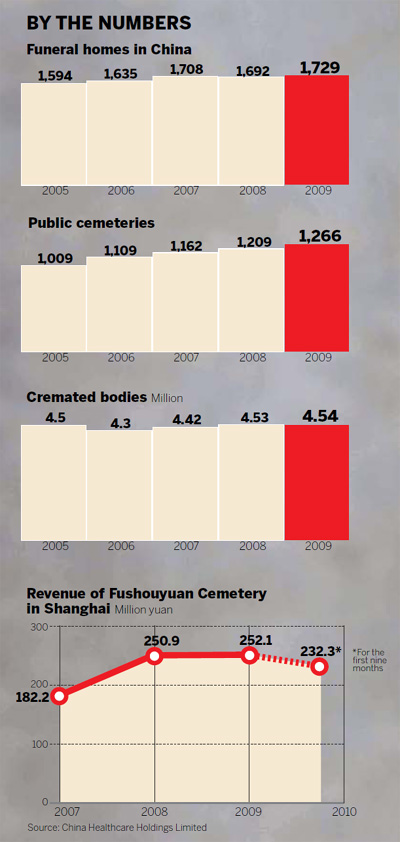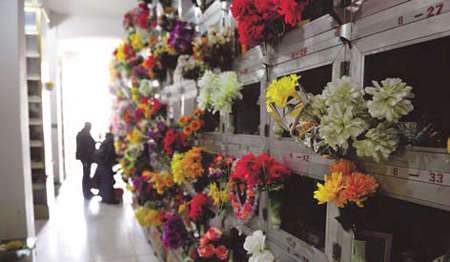Society
A grave concern in China
By Li Woke (China Daily)
Updated: 2011-04-05 07:36
 |
Large Medium Small |
|
Residents pay tribute to heroes and martyrs who sacrificed their lives for the country at Shuangtasi cemetery in Taiyuan, Shanxi province. Zhan Yan / Xinhua |

Chinese witness hike in cemetery plots prices as cities run out of space. Li Woke in Beijing reports.
In the hit comedy If You Are the One, star Ge You goes on a blind date with the intention of finding love, but instead ends up buying two cemetery plots after being convinced prices will surge tenfold. Although an amusing scene in the movie, the soaring cost of graves is no laughing matter for many Chinese. In 2009, trade union worker Sun Li spent 60,000 yuan ($9,200) - more than his entire family earns in a year - for 0.5 square meters in Beijing's Futian cemetery to inter his father-in-law's ashes. Today, a similar plot in the same place costs about 100,000 yuan, while Sun's income remains unchanged. "I wish I could have bought a bigger place for my father-in-law, but I did my best," said the 49-year-old, as he prepared to mark Qingming Festival, also known as Tomb-sweeping Day, on April 5.
This is the time of year when Chinese, young and old, honor lost loved ones and ancestors by tending to their graves, often leaving offerings of food and wine, as well as burning paper money to be used in the afterlife. It is a tradition that has stood for countless generations, fueled largely by the great pride people take in heritage.
Yet, with urbanization soaking up land in cities and putting a squeeze on cemeteries, buying a final resting place for relatives has become a headache for workers on low to average salaries.
Prices for 0.5-square-meter plots at five major Beijing cemeteries, including Futian and Babaoshan, now start at 70,000 yuan, while many in Shanghai charge a minimum of 40,000 yuan. Salesmen in both cities told China Daily that larger tombs often go for more than 300,000 yuan.
By contrast, apartments in downtown Beijing and Shanghai can be purchased for roughly 30,000 yuan per square meter, about one-fifth the cost of a grave, while official statistics show the average annual disposable income in urban areas in 2010 was just 19,109 yuan.
"I want my father-in-law to have a better place to rest in peace and comfort, but now it's even harder to afford than before," said Sun with a sigh.
| 分享按钮 |
